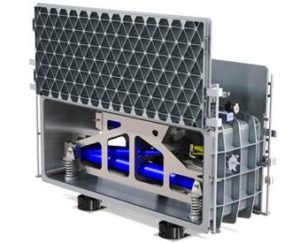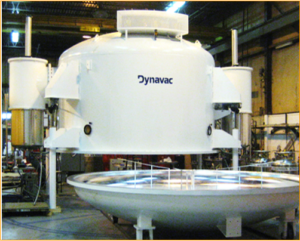Dynavac equipment a key part of The 100 Earths Project’s search for earth-like exoplanets
Hingham, Massachusetts Does life exist on other planets? If so, then there must be planets with conditions suitable for life as we know it. Yale University’s 100 Earths Project is at the forefront of a search for such planets- and Dynavac’s forty years’ expertise in custom vacuum systems and thin-film deposition has made two important contributions to this project.
Over 3,700 exoplanets have been detected by both ground- and space-based astronomical surveys. Many of these are large gas exoplanets, at great distances from earth. In contrast, the 100 Earths Project is surveying nearby stars to find planets with conditions suitable for carbon-based life- small, rocky planets in a “Goldilocks” orbit where liquid water can exist.

Fig 1: Artist’s impression an exoplanet system
Exoplanets are detected by their gravitational influence on their host star’s motion, resulting in shifts in the star’s emitted spectrum. Custom spectrographs measure the spectrum shifts and capture the data for later analysis. Searching for “small” planets places unprecedented demands on all aspects of the scientific instrumentation- the 100 Earth’s Project requires instruments with sensitivities ten times better than previous designs.
The NSF funded the Yale Exoplanet Laboratory to tackle the design and building of the required instrumentation. The Lab took on the challenge drawing on fifteen years’ experience with high-performance planet-hunting spectrographs. Their new instrument, the Extreme PREcision Spectrograph (EXPRES), embodies innovation in five key areas- the coupling of light from the telescope, data analysis, wavelength stability, understanding- and allowing for- stellar noise, and the engineering required to build and operate the instrument. All five areas must work in concert to deliver the required “bleeding-edge” performance.
EXPRES operates in a specially built chamber under high vacuum and carefully isolated from temperature changes and vibration. This isolation from the external environment is critical if the instrument is to function at the required sensitivities. The chamber operates at pressures as low as 10-7 torr, and thermal stabilities of +/- 1mK over twenty four hours.

Fig 2: EXPRES vacuum chamber by Dynavac
With such demanding environmental specifications, the Yale team selected Dynavac, a leader in high-vacuum systems, to build the chamber which forms an important piece of required innovation in engineering. Professor Debra Fischer, principal investigator of the EXPRES project, said “The Dynavac vacuum chamber provides the stability we need to reach record-breaking measurement precision with EXPRES.”
Dynavac’s specialty solutions group is a proven partner to ambitious customers and has made custom high-vacuum equipment for many applications, including ultra-precise instrumentation such as EXPRES, and high-energy physics experiments.
Mounted on the Lowell Discovery Telescope in Arizona, EXPRES is collecting science observations, surveying target G-dwarf and K-dwarf stars for signs of exoplanets. Dynavac made a separate, earlier contribution to the project as it supplied the equipment used to coat the 4.3m diameter, 6,700 pound main mirror with a reflective aluminum coating. Tom Foley, President of Dynavac, commented: “Dynavac is a leader in high-vacuum systems, with nearly forty years’ experience. We’re honored to have made custom equipment for Yale’s EXPRES spectrograph and pleased that it’s searching the heavens using the Lowell Discovery Telescope where our equipment coated the main mirror. We wish the Yale team success in their exciting research.”

Fig 3: Dynavac mirror coater for the Lowell Discovery telescope
About Dynavac Dynavac is a leader in designing and manufacturing high-vacuum systems for thin film deposition, space simulation, and specialty applications. With nearly 40 years’ experience, the company is recognized throughout the industry for expertise in high vacuum technology, machine design, and process technology. Its engineering expertise and U.S.-based manufacturing are supported by extensive field installation capabilities. Dynavac customers in a wide variety of industries around the world. Visit www.dynavac.com
About the Yale Department of Astronomy The Department has a wide range of research including exoplanets, cosmology, high-energy astrophysics, galactic and extragalactic astronomy, solar and stellar astrophysics, and stellar formation and interstellar medium. This research is supported by continuing research and development of cutting-edge instrumentation, of which the EXPRES spectrograph is one example. Visit https://astronomy.yale.edu/research to learn more.
Download a copy of this article here
Image credits: Figure 1: NASA Figure 2: Yale Exoplanet Laboratory Figure 3: Dynavac
